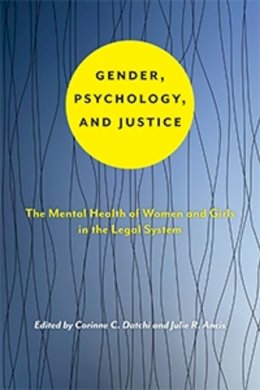
Gender, Psychology, and Justice
Corinne C. Datchi
Reveals how gender intersects with race, class, and sexual orientation in ways that impact the legal status and well-being of women and girls in the justice system.
Women and girls’ contact with the justice system is often influenced by gender-related assumptions and stereotypes. The justice practices of the past 40 years have been largely based on conceptual principles and assumptions—including personal theories about gender—more than scientific evidence about what works to address the specific needs of women and girls in the justice system. Because of this, women and girls have limited access to equitable justice and are increasingly caught up in outdated and harmful practices, including the net of the criminal justice system.
Gender, Psychology, and Justice uses psychological research to examine the experiences of women and girls involved in the justice system. Their experiences, from initial contact with justice and court officials, demonstrate how gender intersects with race, class, and sexual orientation to impact legal status and well-being. The volume also explains the role psychology can play in shaping legal policy, ranging from the areas of corrections to family court and drug court.
Gender, Psychology, and Justice provides a critical analysis of girls’ and women’s experiences in the justice system. It reveals the practical implications of training and interventions grounded in psychological research, and suggests new principles for working with women and girls in legal settings.
Product Details
About Corinne C. Datchi
Reviews for Gender, Psychology, and Justice
Kevin Cokley,Director of the Institute for Urban Policy Research, University of Texas at Austin "Datchi and Ancis have put together a one of a kind, comprehensive, and compelling read. Their book is both scholarly and meaningful. A hallmark of a profound book is that it brings the reader into it, and takes the reader on a journey of discovery. It informs the reader through content knowledge and real experiences that illustrate the challenges in relation to gender and the 'injustice' system. Mental health practitioners, lawyers, judges, and anyone interested in the links between and among the justice system and the intersectionality of gender, race, sexual orientation, and class, in the service of promoting social justice, will find the book an indispensable resource."
Nicholas Ladany,Dean, School of Leadership and Education Sciences, University of San Diego "This book promotes understanding about the biases and challenges faced by women and girls in our justice system. In promoting such understanding and recommending salient reforms."
New York Law Journal
